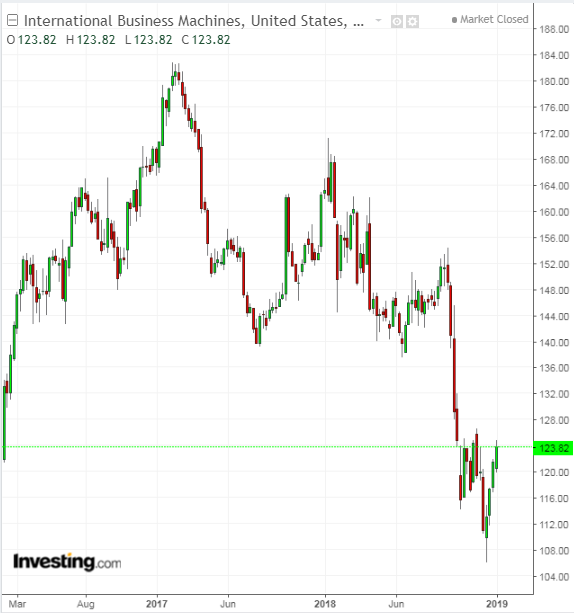- Reports Q4 2018 results on Tuesday, January 22, after the market close
- Revenue Expectation: $21.75 billion
- EPS Expectation: $4.84
There's quit a bit at stake for International Business Machines (NYSE:IBM) when the company reports later today. Its legacy mainframe business is declining and new initiatives, such as cloud computing and artificial intelligence, have so far failed to produce sustained growth for the technology giant.

That situation has put a great deal of pressure on company management to find a way not only to reverse falling sales, but to also instill some life into Big Blue's plunging share price.
The last quarter showed that management has accepted the fact its organic growth strategy isn’t working. As a result, in late October the company announced it was shelling out $34 billion to acquire open-source enterprise maker Red Hat (NYSE:RHT), the biggest deal in IBM's history and one of the biggest deals in the history of U.S. tech.
Red Hat is expected to give IBM an immediate cloud revenue boost. As well, it has a suite of proven software products that can be sold through IBM's global sales force.
But will this acquisition be a game-changer for IBM? Investors are surely wondering whether the expensive addition will be enough to sufficiently reverse six years of declining sales.The 107-year-old company is far behind competitors in the cloud computing space. Amazon (NASDAQ:AMZN), Google (NASDAQ:GOOGL) and Microsoft (NASDAQ:MSFT) have already taken major market share.
In its third quarter report, cloud revenue—which has become a key metric to watch—grew 10% to $4.5 billion. That was slower than the 20% expansion in the second quarter. When IBM reports its Q4 numbers later today, analysts on average expect earnings per share to fall to $4.84, down from $5.14 a year ago. Sales are likely to slide around 4% as well, to $21.75 billion.
In our view, it will be tough for IBM to refashion itself as a leader in new technologies, given its ongoing struggle to break away from its past, when its legacy mainframes—the gigantic computers that help large global companies to process complex IT data—propelled growth.
In addition, we find ourselves doubting the leadership qualities of IBM's Chief Executive Officer Ginni Rometty. She's been trying to turn around the legacy technology giant since 2012 and it seems to have taken six years to figure out that any change will have to come from an outside acquisition.
That said, our aim isn't to downplay Red Hat’s strong position in the cloud computing arena where it’s expected to have generated $3 billion in sales last year. Rather, our problem remains squarely with the IBM's leadership which we feel has failed to foresee the changing tech landscape quickly enough.
IBM, which once dominated computing's early decades with inventions such as the mainframe and later the floppy disk, is no longer an innovator. Indeed, it barely poses a major challenge to today’s tech giants, tough competitors in the new economy who have grabbed and continue to seize the major share of new growth areas that are so crucial for IBM's success.
If IBM isn’t going to be a leader in the new tech economy, is there any reason to still buy the stock? With shares selling at $123.82 as of Friday's close, one possible attraction is its hefty dividend yield that’s now over 5% after the massive beating the stock has taken during the past five years.
However, the stability of that payout is questionable as it largely depends on the company’s turnaround success. Its mainframe business, a cash cow that’s slowly drying up, can’t perpetually support that income stream. At a time when companies are fast migrating towards the cloud, the utility of IBM's mainframe servers is rapidly fading.
Bottom Line
IBM’s performance over the past few quarters shows that it can’t generate consistent growth across its business portfolio. We think there are much better income and growth opportunities available in the market. We see no value in sticking with IBM while waiting for a turnaround that may never come. In our view, IBM is a losing bet that smart investors should avoid.
